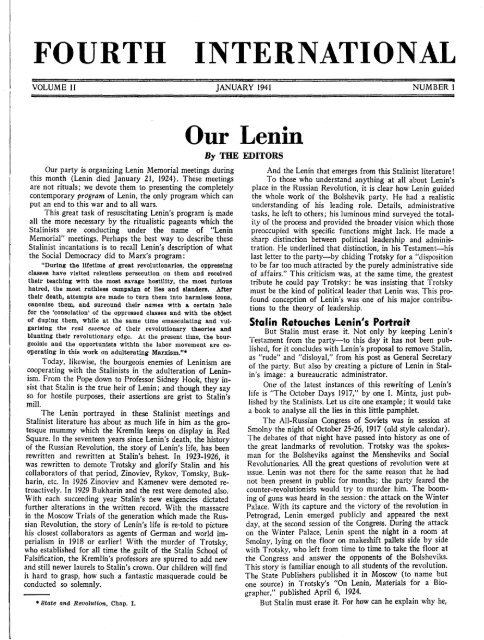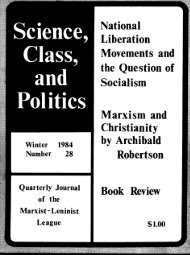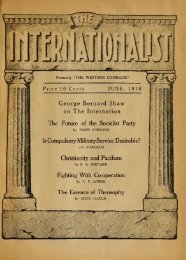January 1941 - Marxists Internet Archive
January 1941 - Marxists Internet Archive
January 1941 - Marxists Internet Archive
You also want an ePaper? Increase the reach of your titles
YUMPU automatically turns print PDFs into web optimized ePapers that Google loves.
FOURTH INTERNATIONAL<br />
VOLUME II JANUARY <strong>1941</strong> NUMBER 1<br />
Our Lenin<br />
By THE EDITORS<br />
Our party is organizing Lenin Memorial meetings during<br />
this month (Lenin died <strong>January</strong> 21, 1924). These meetings<br />
are not rituals; we devote them to presenting the completely<br />
contemporary program of Lenin, the only program which can<br />
put an end to this war and to all wars.<br />
This great task of resuscitating Lenin's program is made<br />
all the more necessary by the ritualistic pageants which the<br />
Stalinists are conducting under the name of HLenin<br />
Memorial" meetings. Perhaps the best way to describe these<br />
Stalinist incantations is to recall Lenin's description of what<br />
the Social Democracy did to Marx's program:<br />
"During the lifetime of great revolutionaries, the oppressing<br />
classes have visited relentless persecution on them and received<br />
their teaching with the most savage hostility, the most furious<br />
hatred, the most ruthless campaign of lies and slanders. After<br />
their death, attempts are made to tUrn them into harmless icons,<br />
canonise them, and surround their names with a certain halo<br />
for the 'consolation' of the oppressed classes and with the object<br />
of dup!ng them, while at the same time emasculating and vuIgarising<br />
the reaZ essence of their revolutionary theories and<br />
blunting their revolutionary edge. At the present time, the bourgeoisie<br />
and the opportunists within the labor movement are cooperating<br />
in this work on adulterating Marxism.".<br />
Today, likewise, the bourgeois enemies of Leninism are<br />
cooperating with the Stalinists in the adulteration of leninism.<br />
From the Pope down to Professor Sidney Hook, they insist<br />
that Stalin is the true heir of Lenin; and though they say<br />
so for hostile purposes, their assertions are grist to Stalin's<br />
mill.<br />
The Lenin portrayed in these Stalinist meetings and<br />
Stalinist literature has about as much life in him as the grotesque<br />
mummy which the Kremlin keeps on display in Red<br />
Square. In the seventeen years since Lenin's death, the history<br />
of the Russian Revolution, the story of Lenin's life, has been<br />
rewritten and rewritten at Stalin's behest. In 1923-1926, it<br />
was rewritten to demote Trotsky and glorify Stalin and his<br />
collaborators of that period, Zinoviev, Rykov, Tomsky,' Bukharin,<br />
etc. In 1926 Zinoviev and Kamenev were demoted retroactively.<br />
In 1929 Bukharin and the rest were demoted also.<br />
\Vith each succeeding year Stalin's new exigencies dictated<br />
further alterations in the written record. With the massacre<br />
in the Moscow Trials of the generation which made the Russian<br />
Revolution, the story of Lenin's life is re-told to picture<br />
his closest collaborators as agents of German and world imperialism<br />
in 1918 or earlier! With the murder of Trotsky,<br />
who established for all time the guilt of the Stalin School of<br />
Falsification, the Kremlin's professors are spurred to add new<br />
and still newer laurels to Stalin's crown. Our children will find<br />
it hard to grasp, how such a fantastic masquerade could be<br />
conducted so solemnly.<br />
• State ana RevoZ'ution, Chap. I.<br />
And the Lenin that emerges from this Stalinist literature!<br />
To those who understand anything at all about Lenin's<br />
place in the Russian Revolution, it is clear how Lenin guided<br />
the whole work of the Bolshevik party. He had a realistic<br />
understanding of his leading role. Details, administrative<br />
tasks, he left to others; his luminous mind surveyed the totality<br />
of the process and provided the broader vision which those<br />
preoccupied with specific functions might lack. He made a<br />
sharp distinction between political leadership and administration.<br />
He underlined that distinction, in his Testament-his<br />
last letter to the party-by chiding Trotsky for a Ildisposition<br />
to be far too much attracted by the purely administrative side<br />
of affairs." This criticism was, at the same time, the greatest<br />
tribute he could pay Trotsky: he was insisting that Trotsky<br />
must be the kind of political leader that Lenin was. This pro-,<br />
found conception of Lenin's was one of his major contributions<br />
to the theory' of leadership.<br />
Stalin Retouches Lenin's Portrait<br />
But Stalin must erase it. Not only by keeping Lenin's<br />
Testament from the party-to this day it has riot been published,<br />
for it concludes with Lenin's proposal to remove Stalin,<br />
as Hrude" and "disloyal," from his post as General Secretary<br />
of the party. But also by creating a picture of Lenin in Stalin's<br />
image: a bureaucratic administrator.<br />
One' of the latest instances of this rewriting of Lenin's<br />
life is "The October Days 1917," by one I. Mintz, just published<br />
by the Stalinists. Let us cite one example; it would take<br />
a book to analyse all the lies in this little pamphlet.<br />
The All-Russian Congress of Soviets was in session at<br />
Smolny the night of October 25-26, 1917 (old style calendar).<br />
The debates of that night have passed into history as one of<br />
the great landmarks of revolution. Trotsky was the spokesman<br />
for the Bolsheviks against the Mensheviks and Social<br />
Revolutionaries. All the great questions of revolution were at<br />
issue. Lenin was not there for the same reason that he had<br />
not been present in public for months; the party feared the<br />
counter-revolutionists would try to murder him. The booming<br />
of guns was heard in the session: the attack on the Winter<br />
Palace. With its capture and the victory of the revolution in<br />
Petrograd, Lenin emerged publicly and appeared the next,<br />
day, at the second session of the Congress. During the attack<br />
on the Winter Palace, Lenin spent the night in a room at<br />
Smolny, lying on the floor on makeshift pallets side by side<br />
with Trotsky, who left from time to time to take the floor at<br />
the Congress and answer the opponents of the Bolsheviks.<br />
This story is familiar enough to all students of the revolution.<br />
The State Publishers published it in Moscow (to name but<br />
one source) in Trotsky's HOn Lenin, Materials for a Biographer,"<br />
published April 6, 1924.<br />
But Stalin must erase it. For how can he explain why he,
















